Games Engagement

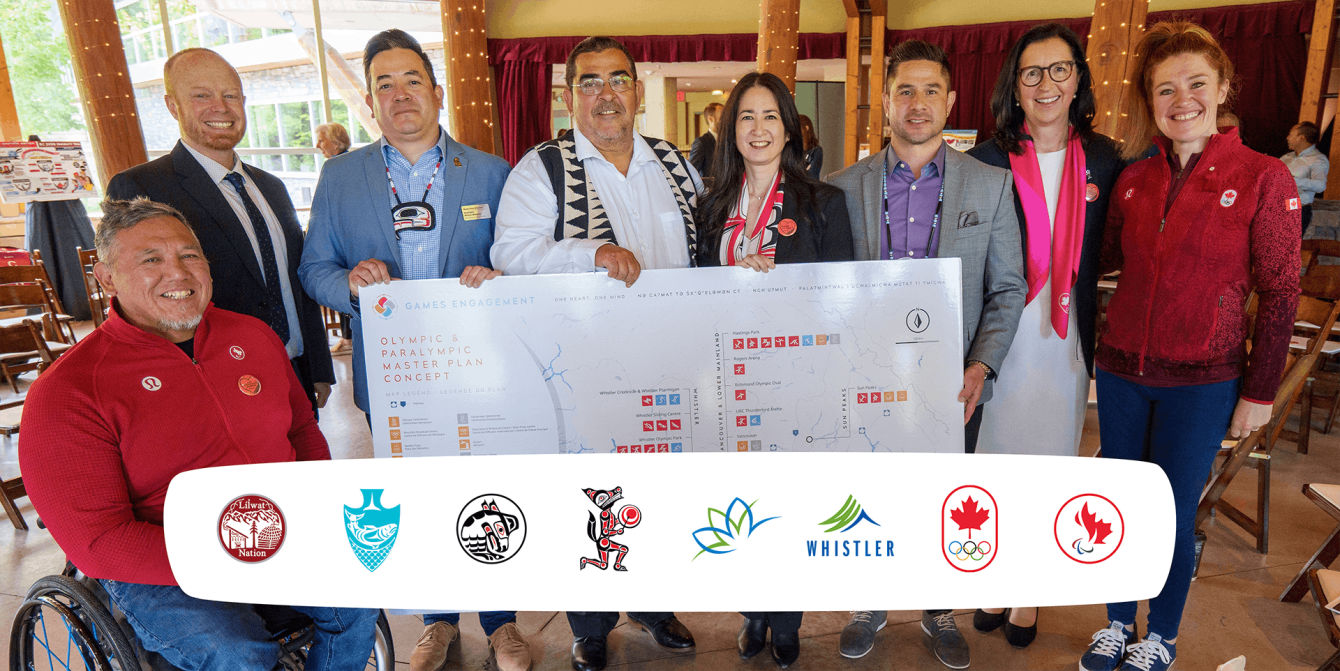
A Future Games
(October 28, 2022) – The Canadian Olympic Committee (COC) and Canadian Paralympic Committee (CPC) issued a joint statement on Friday in reaction to the Government of British Columbia’s announcement that they will not support an Olympic and Paralympic Winter Games in 2030:
“We are disappointed to hear that the Government of British Columbia has declined to support the Indigenous-led efforts to bring an Olympic and Paralympic Winter Games back to Canada.
From the beginning, when the COC and CPC were invited by the Lil̓wat7úl (Líl̓wat), xʷməθkʷəy̓əm (Musqueam), Sḵwx̱wú7mesh (Squamish) and səlilwətaɬ (Tsleil-Waututh) First Nations to participate in a feasibility study, we believed all partners had to be on board for the project to continue – and that includes all levels of government.
While this is not the outcome we were hoping for, there is no denying that the work done so far has been truly transformational. We have set a new precedent for putting reconciliation at the heart of major event planning in this country, bringing to life Call to Action #91 of the Truth and Reconciliation Commission, as well as the principles of UNDRIP and DRIPA. In doing so, we presented a bid that put climate action, fiscal responsibility, and the housing and development needs of the host communities at the heart of the Games concept, which uniquely would have reused existing venues and infrastructure to deliver the Games. Most of all, we were proud to follow a process that served as a model of respect, inclusivity and community.
As individuals and organizations we have learned a tremendous amount through this project, and we thank all of our partners for their collaboration and commitment to this point. We are committed to building on this important work and sharing our lessons with the world. In following this Indigenous-led process, we believe we’ve been part of a model that can apply beyond sport and we encourage all organizations and policymakers across the country to build on this work as they strive to meaningfully put reconciliation in action.
We know that the impact of hosting a Games starts from the time that communities come together to dream of a better future and we are committed to supporting a lasting legacy from the first ever Indigenous-led bid. We believe in the transformative power of sport and heard from thousands of people during our community engagement who shared their hopes for the impact of a 2030 Games. We look forward to continuing our partnership with the Four Host First Nations to support bringing the benefits of sport to more members of the community and are excited about what we can continue to accomplish together. We will have more to share in the coming weeks.”
A Future Olympic and Paralympic Winter Games in BC
Working under the leadership of Líl̓wat (Lilwat), xʷməθkʷəy̓əm (Musqueam), Sḵwx̱wú7mesh (Squamish) and səlilwətaɬ (Tsleil-Waututh) Nations, the 2030 Feasibility Team is exploring the possibility of hosting the 2030 Olympic and Paralympic Winter Games in British Columbia. This is an Indigenous-led, privately funded process that can and should set a precedent for how we work collaboratively as sport leaders, government officials, Indigenous communities, and venue hosts to review opportunities that can greatly benefit our country and its citizens.
These Games can be a beacon of hope, inspire us to live healthier, to find harmony with the land, to lift each other up, and to build a stronger Canada. Indigenous-led, the Games will leverage and enhance the lasting legacies of Vancouver 2010, while accelerating our shared journey of reconciliation. These will be an inclusive, sustainable, climate-positive Games that will drive change by giving communities, businesses, organizations, and the public a common dream to share, while creating legacies that reflect the priorities and needs of a new generation of Canadians.
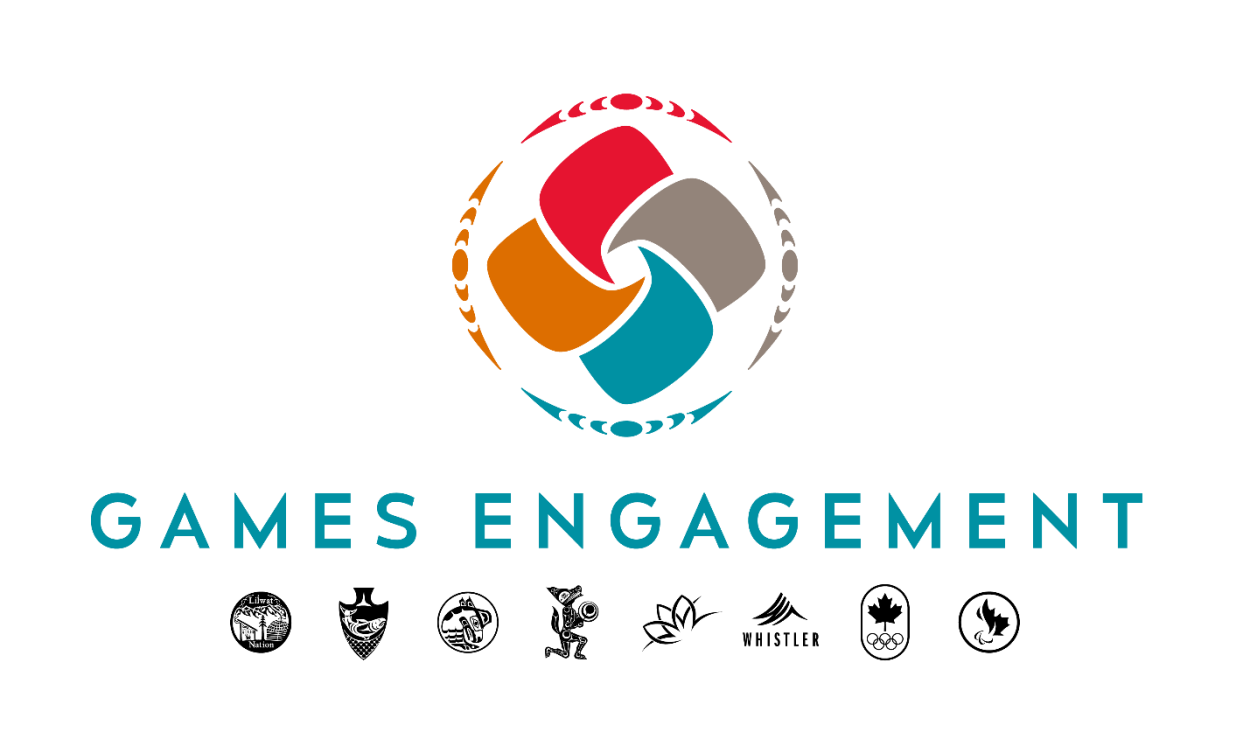
Why Now?
In 2010, the eyes of the world turned to Canada to see a nation proudly share its treasures, with open arms and glowing hearts. And 12 years after the Vancouver 2010 flame was extinguished, you can still feel the afterglow today.
The chance to host an Olympic and Paralympic Games is a once-in-a-lifetime opportunity that remarkably is open to us once more. Hosting another Games in the region will leverage and enhance the powerful legacy of Vancouver 2010, creating new Olympic and Paralympic legacies to support the evolving needs of a new generation of Canadians.
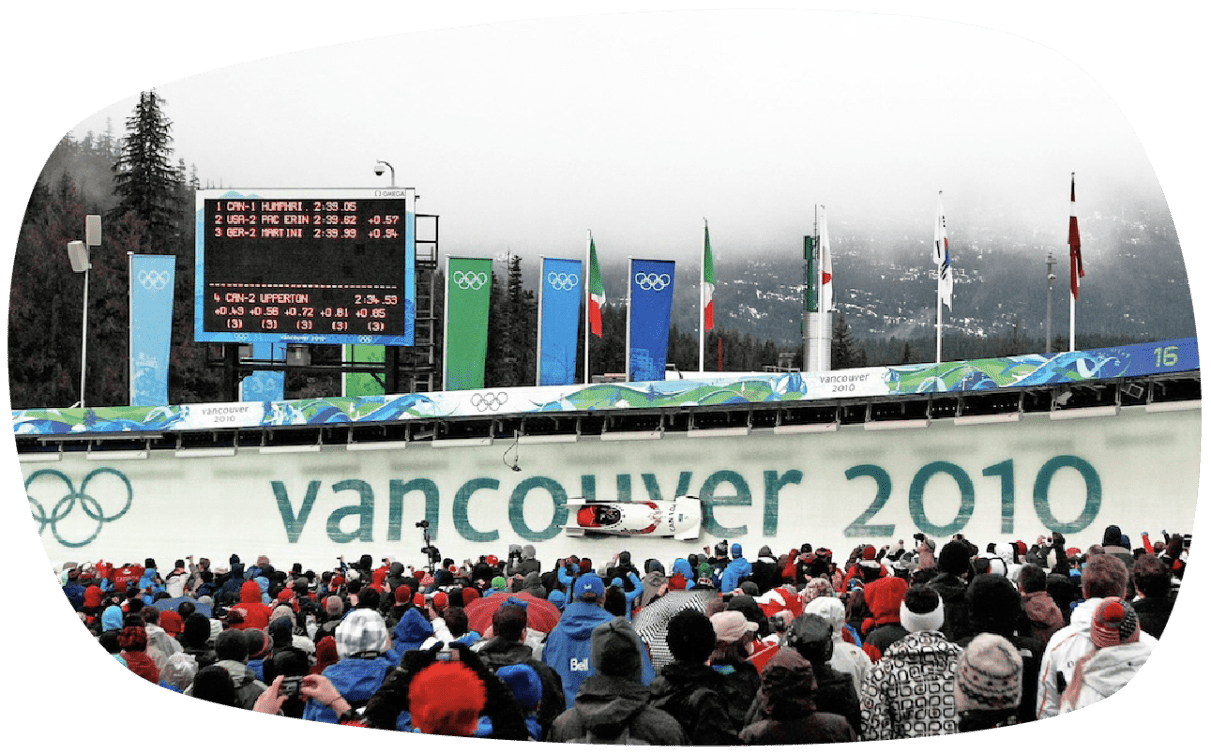
A future Games would give us all a chance to remember what it felt like to truly come together as a country, united in pride and passion. It’s an opportunity to renew the venues, programs and partnerships created by Vancouver 2010 and that continue to move our communities forward today.
And most of all, as an Indigenous-led initiative, it’s a chance to advance a collective commitment to reconciliation, amplify the voices of Indigenous communities and engage with Canadians to reimagine what a Winter Games can be, and how they can help build a better and stronger Canada.
We have the ability to create a Games that will not stand in the shadow of Vancouver 2010, but proudly and boldly beside it, building on the legacies of the past and envisioning an even stronger, more resilient future. We did it before. And we can do it again.

A Games Concept of Three Circles
By following guiding principles that include being fiscally and environmentally responsible, building on 2010 venue legacies, considering weather for outdoor events and creating a Games atmosphere for athletes, spectators and residents alike, the Games concept formed naturally into three circles – a sacred symbol in Indigenous cultures, reflected in the shape of the world, the sun and the moon, and demonstrating the interdependence of all forms of life. The circle shows equality between partners and welcomes everyone to the table.
The three circles, proposed in this Games concept to host 2030 sport events, cultural programming and celebrations are Whistler (Lil’wat and Squamish territories), Vancouver and the Lower Mainland (Musqueam, Squamish and Tsleil-Waututh territories), and Sun Peaks (Adams Lake, Little Shuswap Lake and Neskonlith territories). Read the initial hosting concept here.
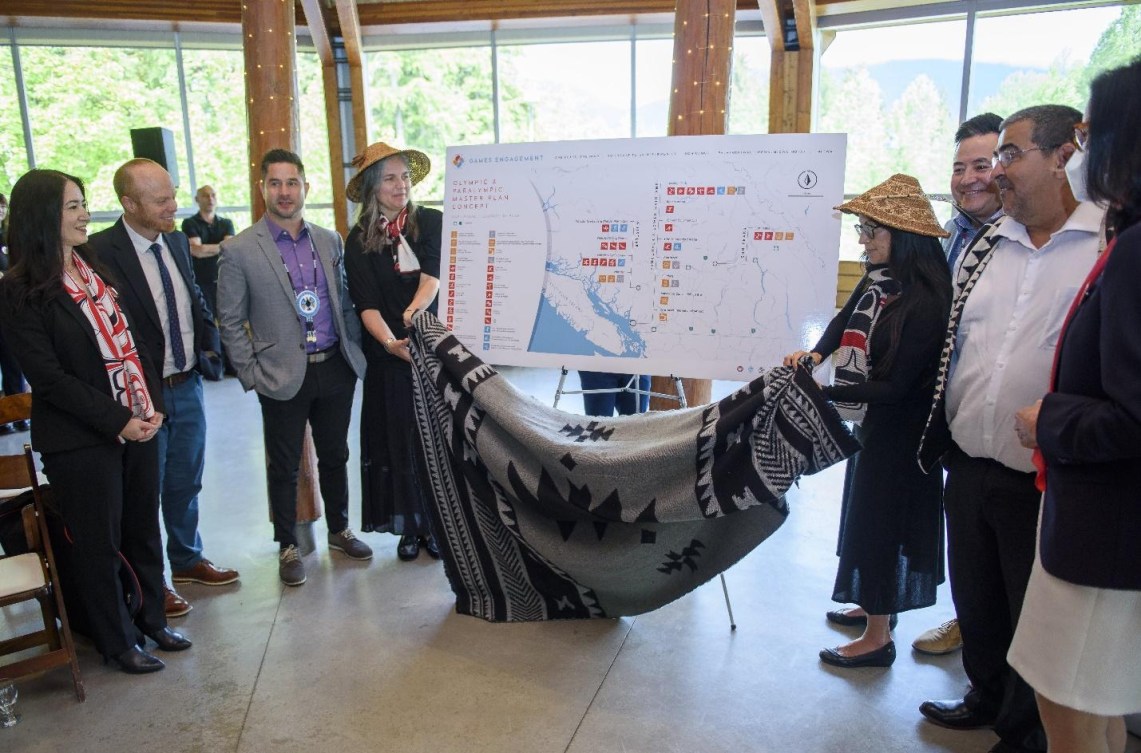
These Games are a chance to remember our past, renew our present as we emerge from the pandemic, and reimagine our future as a nation that holds Truth and Reconciliation, sustainability and our physical and mental health paramount.
Reconciliation – the Heart of the Games
Through the Lil’wat, Musqueam, Squamish and Tsleil-Waututh Nations’ invitation to the City of Vancouver, the Resort Municipality of Whistler, the Canadian Olympic Committee and Canadian Paralympic Committee onto their land and into the conversation, the Nations set the operating terms and have governance-level oversight over every stage of the project. Work will be done following Indigenous protocols and the values of respect, inclusivity, and community throughout every step of the process, and will implement the priorities and principles outlined in TRC91(External link), DRIPA(External link) and UNDRIP(External link).

Moving Forward Together
Just as Vancouver 2010 was a catalyst for economic, cultural and community growth, a future Games in BC is a unique opportunity to accelerate progress and create new legacies. These Games will leverage and enhance the lasting impact of Vancouver 2010, and enact positive change by giving communities, businesses, organizations, and the public a common dream to share.
This Indigenous-led concept as a strong vision rooted in being a good steward of the water, land, mountain and sky, and includes world-class venues. It can be delivered by people with the necessary skills and experience, focused on leaving lasting legacies to benefit future generations, while helping a new generation develop their own skills.
A future Olympic and Paralympic Winter Games can remind us that there are more things that unite us than divide us. It will take all of us working together in purposeful action towards reconciliation.
We are all in one canoe, sharing our energy to move forward.
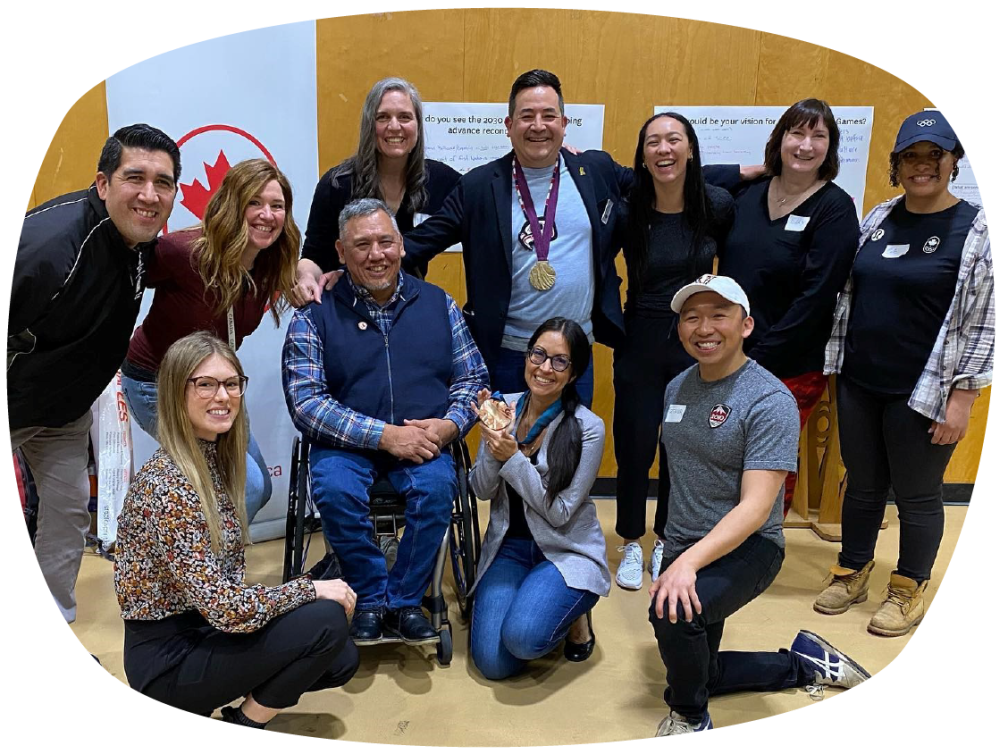
Games Concept
2030 Initial Hosting Concept (6.17 MB) (pdf)
2030 Initial Hosting Concept – Financial Estimates (3.9 MB) (pdf)
2030 Initial Hosting Concept Questions and Answers (212 KB) (pdf)
Letter from Four Nations to City of Vancouver & Resort Municipality of Whistler (63.3 KB) (pdf)
Community Engagement Overview (15.1 MB) (pdf)
Financial Estimates Media Briefing Videos
vimeo links (12?)
Media Releases & Updates
Open Letter from COC and CPC regarding 2030 Winter Games.pdf (219 KB) (pdf)
COC and CPC Statement on BC Government’s Decision Not to Support 2030 Olympic and Paralympic Bid
Community Engagement Newsletter – Sept 2022 (2.09 MB) (pdf)
2030 Feasibility Team Shares New Q&A
2030 Games Hosting Concept Revealed
COC, CPC officially join exploration to bring Olympic and Paralympic Games back to Canada in 2030
FAQs
Why host a Games?
These Games are truly a chance to remember our past, renew our present as we emerge from the pandemic, and reimagine our future as a nation that holds Truth and Reconciliation, sustainability and our physical and mental health as paramount. It’s an incredible opportunity to build on the success of 2010, maintain key infrastructure that affects the health and wellbeing of millions of British Columbians and Canadians, revitalizing the tourism industry and local economy affected by the pandemic, and, accelerate reconciliation by undertaking a process that respects Indigenous protocols from day one and that can serve as an example globally of how to host a modern, sustainable, global event.
What does Indigenous-led mean?
By inviting the COC and CPC and the City of Vancouver and Resort Municipality of Whistler governments onto their land and into the conversation, the Lil’wat, Musqueam, Squamish and Tsleil-Waututh Nations set the operating terms and have governance-level oversight over every stage of the project. We are proud to be following Indigenous protocols and the values of respect, inclusivity, and community throughout every step of the process. This respects the Nations, their protocols, and their territories as it implements the priorities and principles outlined in TRC91, DRIPA and UNDRIP.
How does being Indigenous-led change the process at an operational level?
In 2010 the Four Host First Nations were invited into the process after it commenced and advanced. Now they’re a part of it from the start and they have set the terms and values by which the work will be done. At a day-to-day level this means that, with the permission of the Nations, the COC has engaged a group of experts in the region to do the necessary research and technical assessments to determine the feasibility of a future Games. As it has been determined that a feasible future Games concept exists in BC, the potential concept is currently being put forward and all the partners – the four Nations, municipal, provincial and federal governments, community stakeholders, and the COC and CPC – are reviewing it and engaging with community members. All partners will review and assess before advancing the project into an official bid.
What do Indigenous-led Olympic and Paralympic Games look like?
That answer will be shaped by the discussions happening during the Engagement Phase, but all partners believe that it begins with values. These Games will be a living, breathing example of what happens when partners come together to do things the right way. With a clear vision, values create the space for how people will act. The Indigenous values of community, respect and inclusion are at the center of this and align with the new Olympic motto of faster, higher, stronger, together, and the Paralympic values of courage, determination, inspiration and equality. Together we can create a Games that will change Canada and the world for the better.
How can these Games impact Reconciliation?
We believe these Games can be a positive force for reconciliation. Together we intend to identify, measure and support the movement of reconciliation to make a stronger Canada. Once we identify what can happen, which is the impact and legacy work, then we want to measure and support those initiatives that are happening currently through specific actions. These Games will be a living, breathing example of what happens when partners come together to do things the right way.
Who is in charge of the Games Organizing Committee?
Should Canada bid for and be awarded the 2030 Games, a legal entity called the Organizing Committee for the 2030 Winter Olympic and Paralympic Games will be formed. As with VANOC, all signatories to the Multi-Party Agreement will have representation on the Board of Directors. The make-up of the Board is established as part of Multi-Party Agreement discussions.
Financial Estimates FAQ
Who pays for these Olympic and Paralympic Games?
Feasibility and Bid Work
The feasibility and potential bid work is being done under the leadership of the Lil ̓ ’wat7úl (Lilwat), xʷməθkʷəy̓əm (Musqueam), Sḵwx̱wú7mesh Úxwumixw (Squamish) and səlilwətaɬ (Tsleil-Waututh) Nations (Four Host First Nations), and is 100% privately funded by the Canadian Olympic and Paralympic Committees.
Operations
The Organizing Committee ($2.5-$2.8B) would be 100% privately funded, through a direct contribution from the International Olympic Committee (broadcast rights and international sponsors); domestic sponsors; ticket sales; merchandise sales; and licensing rights. The majority of the funding comes from outside of British Columbia and is spent in the region. It is only available if the Games are held.
Venues
The proposed 2030 Games capital plan is focused on improving and extending the life of existing venues. This would be publicly funded. Based on the Federal Policy for hosting international sport events, the Federal Government will contribute up to 50% of the total public sector contribution.
The joint Provincial and Municipal governments’ share of venue upgrades would be $150-188M total over five years, or $30-38M per year. For perspective, the Vancouver Convention Centre and the PNE, only two of the 17 venues in the Games concept, together bring in over $550M in economic impact every year, as noted in their annual reports.
Villages
More than 1000 housing units will be built in the form of three Athletes’ Villages and legacy housing for First Nations. The joint Provincial and Municipal governments’ share of the contribution payments would be $83-135M (50% of $165-267M), or $17-27M per year.
The remainder of the development costs for the Villages would be borne by private developers in Vancouver (MST Development Corp, a partnership of the Musqueam Indian Band, Squamish Nation and Tsleil-Waututh Nation) and Sun Peaks. The developer of buildings for the Whistler Athletes’ Village is still being discussed.
Major Infrastructure
The 2030 Games Concept does not require major infrastructure projects. For example, a potential SkyTrain Extension to UBC is not required, nor contemplated for use by 2030 Games athletes, officials, etc. Likewise, no upgrades are required to the Coquihalla or Sea to Sky Highways.
How will the municipal financial contributions be determined?
The Province of BC has stated it is looking for all parties to share in the benefits, legacies, costs and risks of planning and delivery the Games but has not set a required amount. The funding share of the capital program above will be discussed as part of the Multi-Party Agreement, which lays out the commitments from each party as well as legacies and other elements around hosting the Games.
It is necessary that all parties now engage in open and collaborative, but still non-committal dialogue on the Multi-Party Agreement. We need to be in the canoe together to move forward. This is the process needed to obtain clarification from all parties on contributions and indemnities.
Essential Services
Essential services are those services the municipalities provide regularly for events: the Celebration of Light, Vancouver Pride Festival, the Grey Cup, HSBC Rugby Sevens, and large events at BC Place and Rogers Arena. The difference for a 2030 Games would be the scale and duration of the event. The City of Vancouver reported $22M (current 2022 dollars) in essential services for the Vancouver 2010 Games ($17.6M in past dollars). In 2010 these costs were primarily covered by the provincial government. The province has not ruled out a contribution for 2030 but has cautioned it should not be assumed.
The City of Vancouver spent an additional $8.7M (current 2022 dollars) for the Games Office to manage city planning and delivery with respect to the Games ($6.9M past dollars). This included the City managing a live site, building a competition venue and a village – none of which are part of the 2030 Games concept. Hastings Park will serve as the live site and as that is within the Games footprint it will be covered by the Organizing Committee.
RMOW reported $3.5M (current 2022 dollars) in essential services for 2010 ($2.8M in past dollars) plus $2.5M (current 2022 dollars) for the Games Office to manage city planning and delivery ($2M in past dollars).
For context, according to a PricewaterhouseCoopers study on Vancouver 2010:
• During the first three months of 2010, hotel revenues were $130 million higher than they would normally be in Vancouver and Whistler, BC, at that time of year.
• Revenue from restaurants and bars was up $129 million in the same time frame.
Did the municipalities contribute more than essential services in 2010?
Yes. Both municipalities used the profile and opportunity of the 2010 Games to attract significant additional funding from sponsors and governments to achieve additional priorities outside of Games requirements.
The City of Vancouver leveraged the 2010 Games to upgrade the Queen Elizabeth Theatre, Vancouver Playhouse and Orpheum Theatres. It built the Olympic Streetcar Demonstration Line and strengthened the Granville Bridge; it invested in public art, renovated City Hall and upgraded the Planetarium roof, among other projects.
The Resort Municipality of Whistler leveraged the 2010 Games to showcase Whistler, implement initiatives of its Carbon Management Program, create a public art program, hold celebrations and create a Neighbourhood of Nations.
Is there sufficient time for cost-benefit analyses?
There are seven months (August 2022 to February 2023) before the bid would be submitted which gives ample time for funding partners to complete cost-benefit analyses of the 2030 project, beyond the preliminary benefits analysis completed based on the literature review of 2010 impacts.
Process FAQ
Is it possible to negotiate a Multi-Party Agreement in 7 months?
Yes. The preparatory work would take place at the staff level of all partners from August to November 2022 (4 months) with the negotiation between parties taking place between December 2022 and February 2023 (3 months).
Working together at the staff and executive levels over the coming 7 months would be a significant, tangible example of reconciliation in action, following the commitments made in the United Nations Declaration on the Rights of Indigenous Peoples Act (Federal), the Declaration on the Rights of Indigenous Peoples Act (Provincial), and with Vancouver as a City of Reconciliation and RMOW as a party commitment to reconciliation.
It should be noted that the Multi-Party Agreement is a domestic precedent set during the Vancouver 2010 bidding process. It is not a requirement to bid internationally.
What about other contractual requirements?
There are two Venue Use Guarantees that the City of Vancouver would be involved in negotiating: Hastings Park and the PNE are one and training venues is the second. The process for all Venue Use Guarantees is on track to be completed by December 2022 and is being led by the 2030 Feasibility Team.
The majority of other guarantees as part of the bid submission will be completed by January 2023. The more complex guarantees are negotiated with the IOC as needed should Canada be invited into targeted dialogue in December 2022, with target completion at the end of March 2023.
These guarantees relate only to the Games concept as proposed. Should the IOC change terms and require additional criteria outside the agreed concept, the IOC has committed to cover the incremental costs.
The Olympic Host Contract is not signed until the Games have been awarded.
What public engagement has taken place to date? (July 18, 2022)
Following the Indigenous way, engagement is a process of respectful and inclusive exchange and has taken numerous forms over the past month. Through 16 engagement events held thus far (open houses, pop-up booths, workshops) both in-person or virtually, we have had direct conversations with more than 2,200 people across the Vancouver and Whistler region. We also are engaging with the public via gamesengagement.ca and engagementjeux.ca, and to date over 1,500 people have completed the community engagement survey.
What about issues such as temporary displacement of housing
Housing is a major issue for our communities and the proposed investment in villages and legacy housing reflected in the capital plan supports our commitment to this challenge. In addition, we have the benefit of the experience from the 2010 Games. We can build on the successes but more importantly learn from the challenges and what did not work well. Working with affected communities, we can be deliberate in putting in place measures to address these issues.
In the News
FAQ: Future Olympic and Paralympic Winter Games hosting concept(External link)
08/20/2022 – Vancouver council approves next step in 2030 Indigenous-led Olympic bid(External link)
06/15/22 – Proposed 2030 Olympics venues: What’s new and what’s back(External link)
06/14/22 – Indigenous-led B.C. bid for 2030 Winter Olympics moving ahead(External link)
